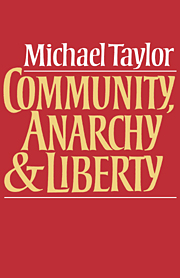2 - Social order without the state
Published online by Cambridge University Press: 02 December 2009
Summary
My point of departure for the main argument to be developed in this book is that, in any sort of society, social order is generally found desirable, but its maintenance is nevertheless problematical and the chief immediate sources of the problem are to do with social order being an example of what economists call a public or collective good and with individual preferences having certain characteristics. I shall explain and provide a partial defence of this starting point in the following section.
When I say that the maintenance of social order is a problem, I mean roughly that it is not ensured merely by socialisation reinforced by ritual and the gestures and signs of everyday conversation and other social intercourse (important though these are), but requires in addition the use of controls which involve the use of threats. In this sense, the maintenance of social order is a problem which is not peculiar to possessive market societies; it is also a problem (though perhaps a less acute one) for primitive societies without markets and with individual possession of only the barest ‘non-strategic’ goods; and even in the sort of society envisaged by certain Utopian socialist and communitarian anarchist writers it would not be solved as effortlessly as they generally suppose.
Social order and public goods
Before embarking on the argument about the maintenance of social order, a brief account of the concept of a public good is required.
- Type
- Chapter
- Information
- Community, Anarchy and Liberty , pp. 39 - 94Publisher: Cambridge University PressPrint publication year: 1982



